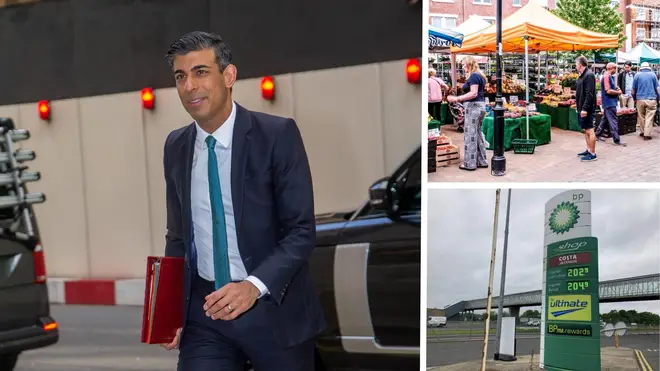
Simon Marks 4pm - 7pm
17 June 2022, 09:56 | Updated: 17 June 2022, 10:13

The Chancellor has signalled there will be no relief in the cost-of-living crisis in the form of tax cuts until soaring inflation is brought under control.
The Bank of England has predicted inflation will top 11% in the autumn and yesterday industry experts from the Institute of Grocery Distribution (IGD) issued a similarly alarming prediction that food prices will rise by as much as 15 per cent in the coming months.
Rishi Sunak signalled there is little chance of more tax cuts soon, telling ITV News: "I will make sure that I handle our borrowing and debt responsibly so that we don't make the situation worse and increase mortgage rates more than they otherwise are going to have to go up."
Michael Gove also appeared to indicate that fellow Conservative MPs pushing for tax cuts would have to wait as such measures could fuel runaway inflation.
Speaking exclusively to LBC's Nick Ferrari at Breakfast earlier this week, the Prime Minister pledged to 'bear down on taxation.'
Boris Johnson told Nick the government wanted to "make sure we do everything we can to reduce the burden of taxation," revealing "everybody who pays National Insurance contributions" would get "a tax cut, on average, of £330."

Boris Johnson: The government is making tax cuts as fast as we can
The Chancellor told the Bank of England's Governor Andrew Bailey that fiscal policy must remain "responsible" and not "exacerbate" inflation.
In a letter to Mr Bailey, Mr Sunak wrote: "This is why, in responding to urgent cost of living pressures that people are facing, I announced a series of measures which are timely, targeted, and temporary to help households manage the squeeze on real incomes whilst not adding unnecessarily to inflation".
Communities Secretary Mr Gove later said he agreed with Mr Sunak that tax cuts should be shelved until inflation is brought down.
But Business minister Paul Scully told Nick Ferrari at Breakfast on LBC this morning: "I want to get back to being a low-tax Government trusting people to spend their own money.
"However, we put £408 billion into the economy over Covid - that does give us 408 billion reasons to get this next bit right, to make sure that the gains that we had protecting livelihoods and businesses don't get lost in these headwinds that are with us.
"Nonetheless, though, there are some tax cuts that are still going through, whether it's the air passenger duty, the 5p off fuel duty - albeit that that's obviously got swallowed up by massive global pressures.
"But importantly for businesses and growing, the super deduction on capital investments; and for individuals, the changes to National Insurance thresholds which they will actually see - something like 80% of workers will see more money in their pay packet next month when that kicks in."
On Thursday, Mr Gove told The Times CEO Summit in London that the pressure on the public finances meant the Government was unable to provide the level of support to people that it would like.
"When you are squeezing inflation out of the system, you will rely on the Bank of England and the Government having the fiscal and the monetary policies which will inevitably mean we cannot do all the things that we would, in ideal circumstances, like to do in order to support people through a difficult period," he said.
The cost of living has been soaring for months, with consumer prices index (CPI) inflation hitting a 40-year high of 9% in April when the energy price cap was hiked.
But things are set to get even worse later this year, with the Bank of England raising its peak inflation prediction for October - when energy prices could go up even further - from 10% to over 11%.
Mr Sunak has announced multi-billion pound help for struggling households, much of which is set to come in when energy bills rise again in October.
But it might prove somewhat of a double-edged sword, the Bank said, adding another 0.1 percentage points to CPI in the first year.
In a TV interview, the Chancellor pointed to the lifting of the threshold at which employees start to pay national insurance in a few weeks as he insisted the "direction of travel is to reduce people's taxes".
But he appeared to reject further short-term tax cuts.
The Chancellor added that people should be "reassured" that inflation will be tamed through "constrained borrowing and debt", action by the Bank of England and measures such as improving energy supply.
"People should feel confident that we will get through this, we will get inflation down and strong growth will return," he said.
The Institute of Grocery Distribution (IGD) predicted this week that food prices will rise by 15 per cent in the coming months as people pay more for household staples such as meat, cereal, dairy, fruit and vegetable products.
Food items that rely on wheat - such as bread, poultry and pork - could see the most rapid price rises in the summer or autumn, the IGD said.
Brexit and supply chain disruption linked to the Covid-19 pandemic are also thought to be factors affecting prices.